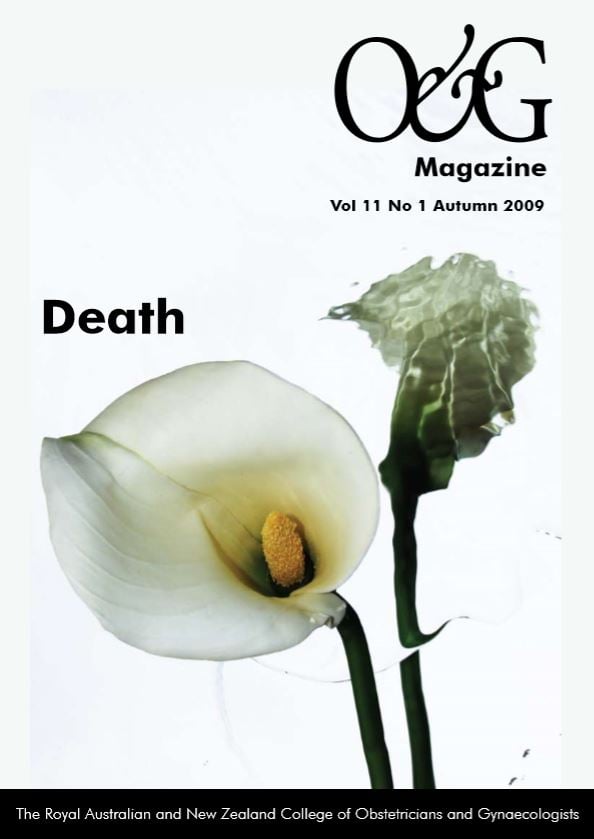‘Our present society is not willing to experience death, in the sense that it is hidden by a conspiracy of silence. The sudden and unexplained death of a baby is very tragic, yet it is not regarded as something to be sad over, especially if the baby has never lived. As a consequence, parents are often not given permission by family or friends to mourn the death of their baby, and they are very often left alone in an apparently unsympathetic world, not knowing how to feel and not knowing how to cope.’
– Kubler Ross, 19861
Holistic care of families experiencing perinatal grief is part of a marked improvement underway in health practices surrounding stillbirth and infant death. As prenatal testing becomes increasingly sophisticated and routine, more parents are learning devastating news before their babies are born. Although there is an option to terminate the pregnancy in these early stages, there are parents who will wish to continue the pregnancy despite the devastating outcome. Holistic care encourages parents to make the decision that is ultimately best for them. If they choose to continue with the pregnancy and providing that there are no risks to the mother’s health, then every effort should be made to support the parents’ decision.
Holistic care supports that the staff involved with parents’ care should provide consistent, honest and comprehensible information from the the time of initial detection of problems and allow for questions as the reality of the information is processed by the parents. Holistic care encourages that strong consideration be given to offering the parents nonjudgmental, emotional support, rather than offering sedation.
Providing holistic care for parents through a perinatal loss contributes to a high standard of healthcare, as well as contributing to a normal grieving process. The role of the caregiver extends far beyond covering the physiological needs of the infant and starts at first contact with the parents. By creating an atmosphere of trust between parents and caregivers and a sense of attachment and bonding with the baby, a partnership will be formed between parents and caregivers, which should result in the most appropriate recommendations and decisions for that particular family.
In a holistic approach to perinatal grief management, a multidisciplinary team approach is recommended, including doctors, midwives, social workers and spiritual support, to care for the family before, during and after birth. The holistic care approach to perinatal loss supports families from the time of diagnosis, when their grief journey begins, through to a point where parents are able to manage the grief and loss of their baby within their own social networks.
The death of a baby is a profound loss and it is important and advantageous to acknowledge a family’s need to grieve for their baby. The death of a baby is particularly difficult to endure because parents envision an entire lifetime for their baby from the time of confirmation of the pregnancy and because their expectations and vision have been built over time. With the death of their baby, parents lose an entire future. Parents also grieve for the loss of their own parenthood. Perinatal death represents multiple losses to parents, including the loss of a significant person, the loss of some aspect of self, the loss of external objects, the loss of a stage of life, the loss of a dream and the loss of creation. Culturally, a couple whose first pregnancy ends in a loss has not completed the rite of passage into parenthood, which symbolises adult status.2
The grieving process for parents can become complicated when the loss of a baby occurs in the very early stages of the pregnancy. There is frequently a social negation of the loss, particularly if the loss occurs in the first trimester of the pregnancy. It is often not recognised as a ‘real death’ because the baby would not have survived outside the womb. With the loss of unborn babies in the early stages of pregnancy, it is often perceived that there is no dramatic absence to signal the loss, causing the parents to have difficulty internalising the fact that the death has really occurred.
‘Recollecting and re-experiencing the deceased and the relationship is made more difficult for bereaved parents because there is little or nothing concrete to review or remember realistically.’3
Factors which have been reported to increase the risk of adverse psychological outcome for parents after perinatal death include: perceived inadequate social support; traumatic circumstances surrounding the death; difficulties coping with a crisis in the past; problematic relationships in the nuclear family; and the presence
of other life crises. In addition, generally, mothers report greater distress than do fathers.4
Care provided by professionals to parents before the birth of the baby and care provided to help the parents realise their loss is markedly different to the type of care that is needed after the loss. Following the birth of the baby, social workers and spiritual support workers can often provide families with the support they need to facilitate the grieving process. Parents need to spend time with their baby and honour their cultural and religious beliefs.
Social workers and nurses often have the delicate task of collecting mementos for the parents: photographs, hand and footprints in either ink or plaster, locks of hair if possible, the baby’s identification bracelet and the cot identification card. Cot identification cards and identification bracelets can be made for babies who are born in the very early stages of pregnancy, as this validates the baby’s existence for the parents in the months ahead.
Holistic care highly recommends that continuity of care is provided to parents. Having the same professionals involved with the parents throughout their involvement within the health system, means that parents are able to develop a bond and rapport with those professionals and avoid retelling their ‘story’. Continuity of care also ensures that parents are not given conflicting information.
Caregivers who provide this level of care will fulfill the unique needs of grieving parents by assisting them to have positive memories of their baby and by giving them a feeling of being cared for in the midst of their pain and grief.
Grief is a normal and natural response to loss. While research5 demonstrates that, generally, grief dissipates over time, providing quality holistic care before, during and after the loss of a baby greatly assists in the parents’ recovery.
‘We walk with families through pregnancy, birth, life and bereavement – supporting the dignity and value of each life.’6
References
- Kuebelbeck A. Perinatal Hospice: A Holistic Approach for When Death Comes at the Beginning of Life. The Forum Newsletter. Association of Death Education and Counselling Janury/February/March 2005; Volume 31,Issue 1, p6.
- Guidelines for health care professionals supporting families experiencing a perinatal loss. Paediatrics and Child Health 2001; 6(71): 469-477. Reaffirmed February 2008: www.cps.ca/English statements FN/fn01-02.htm .
- IBID 468,469.
- IBID 470.
- Flenady V, Wilson T. Support for mothers, fathers and families after perinatal death. Cochrane Database of Systemic Reviews 2008; Issue 1; p3. Art. No: CD000452.DOI.10.1002/14651858.CD000452 pub2.
- Kuebelbeck A. Perinatal Hospice: A Holistic Approach for When Death Comes at the Beginning of Life. The Forum Newsletter. Association of Death Education and Counselling Janury/February/March 2005; Volume 31,Issue 1, p7.






Leave a Reply